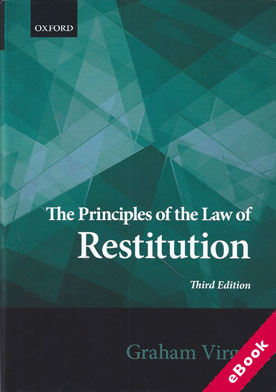
The device(s) you use to access the eBook content must be authorized with an Adobe ID before you download the product otherwise it will fail to register correctly.
For further information see https://www.wildy.com/ebook-formats
Once the order is confirmed an automated e-mail will be sent to you to allow you to download the eBook.
All eBooks are supplied firm sale and cannot be returned. If you believe there is a fault with your eBook then contact us on ebooks@wildy.com and we will help in resolving the issue. This does not affect your statutory rights.
The third edition of The Principles of the Law of Restitution brings this widely cited and influential volume fully up to date. It has been substantially rewritten to reflect the significant changes in the law of restitution and the expansion in the theoretical and critical commentary on the subject.
Following important decisions of the Supreme Court and other courts, large-scale changes have been made to the chapters on enrichment, at the expense of the claimant, mistake, claims against public authorities, and change of position. Additionally, this edition contains a new chapter on the operation of juridical bars on restitutionary claims.
References to developments in other jurisdictions have been expanded for this edition, reflecting the significance of these changes and how they assist in the interpretation of English law and provide a basis for criticising that law. Further, in the light of leading cases and the contributions of restitutionary scholars around the world, the author's views on specific controversial debates about the ambit, function, and interpretation of the subject have changed, sometimes radically.
One significant aspect of the book remains unchanged: the book continues to focus on the identification and analysis of the principles which underpin the law of restitution as a whole, but with reference to its three distinct parts: unjust enrichment, restitution for wrongs, and the vindication of property rights. This approach provides the reader with a peerless guide to the law of restitution.